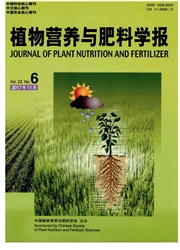

 中文摘要:
中文摘要:
为了探索玉米根际土壤微生态特征对接种自生固氮菌的响应机理,在盆栽实验条件下,研究了3株自生固氮菌—褐球固氮菌(Azotobacter chroococcum YCYS)、芸苔叶杆菌(Phyllobacterium brasssicacearum QL54)和类芽孢杆菌(Paenibacillus sabinae MX31)接种盆栽玉米(Zea mays L.)之后,玉米根际土壤酶活性和细菌群落功能多样性的变化。结果表明,接种自生固氮菌对玉米根际土壤酶活性和细菌群落功能多样性产生了一定的影响,而且不同自生固氮菌之间的接种效果有一定的差异。接种褐球固氮菌(A.chroococcum YCYS)和类芽孢杆菌(P.sabinae MX31)玉米根际土壤脲酶活性分别比对照高20.55%和9.58%。然而接种处理对玉米根际土壤碱性磷酸酶活性的影响差异不显著(P〉0.05)。BIOLOG结果显示,接种自生固氮菌可以提高细菌总代谢活性,其中接种褐球固氮菌(A.chroococcum YCYS)处理的AWCD是对照的1.8倍,并且细菌群落丰富度指数(R)显著高于对照(P〈0.01)。不同接种处理土壤根际细菌生理碳代谢优势群落结构不同。主成分分析(PCA)表明接种自生固氮菌可以调控根际土壤细菌群落功能多样性。
 英文摘要:
英文摘要:
In order to explore the response of soil micro-ecological characteristics associated with the rhizosphere of maize (Zea mays L. ) to azotobacter' s inoculation, the responses of soil enzyme activities and bacterial community functional diversity in the rhizosphere soils of maize seedlings inoculated with azotobacter isolates including Azoto- bacter chroococcum YCYS, PhyUobacterium brasssicacearum QL54 and PaenibaciUus sabinae MX31 were examined in pot culture conditions. The results show that the inoculation of azotobacter can change the soil enzyme activities and regulate the soil bacterial functional community associated with the rhizosphere of maize, and different strains have different inoculation effects. Compared with the control, the urease activities of A. chroococcum YCYS and P. sabinae MX31 treatments are increased by 20. 55% and 9.58% , respectively. However, there are not significant differences between the inoculation and control treatments in the phosphatase activity ( P 〉 0.05 ). The BIOLOG results show that the azotobacter inoculation can increase the total bacterial metabolic activity, the activity of inoculating A. chroococcum YCYS is 1.8 times higher than that of the control. Meanwhile, the species richness (R) is significantly higher that that of the control (P 〈0. 01 ). The results of six carbon sources reveal that there are different carbon metabolic communities among the treatments. Principle components analysis (PCA) suggests that the azotobacter inoculation can regulate the bacterial community associated with the rhizosphere soils.
 同期刊论文项目
同期刊论文项目
 同项目期刊论文
同项目期刊论文
 Effects of zinc on metabolism and oxidative enzyme activities of microbe communities during composti
Effects of zinc on metabolism and oxidative enzyme activities of microbe communities during composti Effects of Cu on metabolisms and enzyme activities of microbial communities in the process of compos
Effects of Cu on metabolisms and enzyme activities of microbial communities in the process of compos 期刊信息
期刊信息
